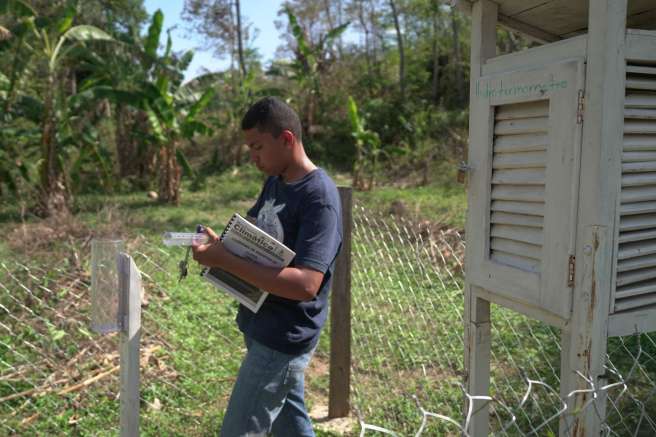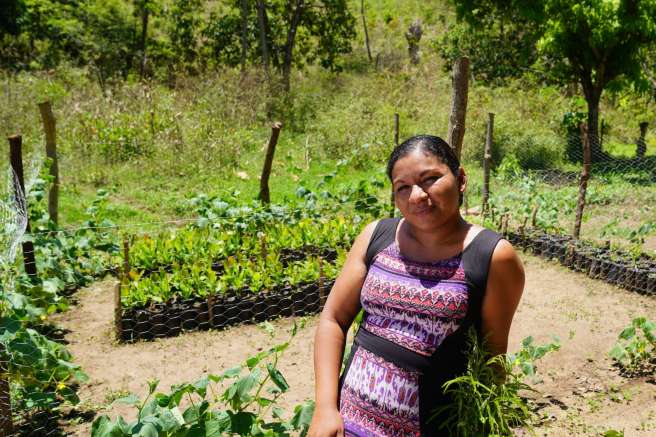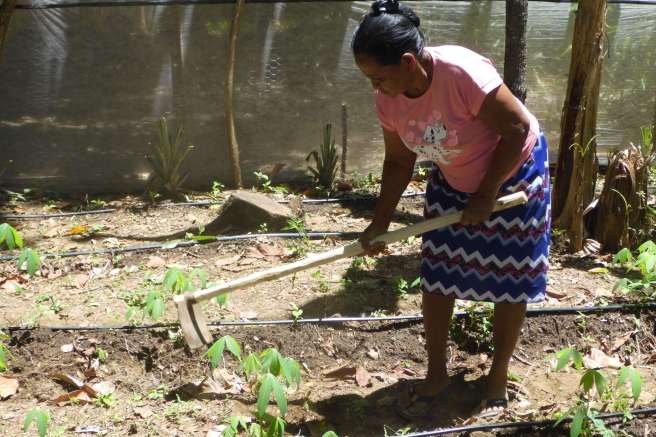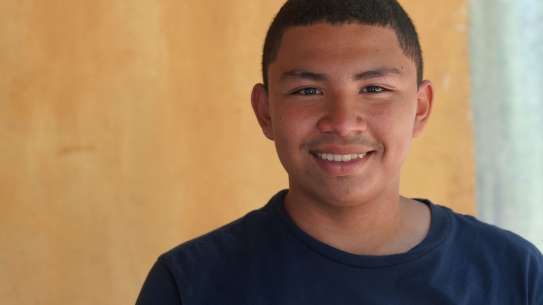'Climate change will continue but that doesn't mean we just fold our arms and do nothing'
Elvin Leonel Castañeda lives in the rural community of Santa Teresa de Las Bateas in Choluteca, southern Honduras. Elvin’s community is located along Central America’s ‘Dry Corridor’, an area of land that spans parts of Honduras, Guatemala, Nicaragua and El Salvador. It’s an area vulnerable to extreme weather from extended periods of drought to heavy rainfall, which causes severe flooding of nearby rivers that wipes out harvests, or worse.
“Climate change is affecting our community. Crops are lost due to the excess rainfall. The rainy season’s hot spell is longer and is causing droughts. We’ve had deaths from the nearby river overflowing,” Elvin said.
Thanks to your generous support, Christian Aid, through our local partner Centro de Desarrollo Humano (CDH) is supporting people living in four rural communities in Honduras’ ‘Dry Corridor’ to better prepare for and protect themselves from extreme weather as well as to diversify the crops they grow to help them adapt to the impacts of climate change.
With support from Christian Aid, CDH has installed 16 community weather stations complete with a gauge to measure rainfall levels as well as a thermometer and hygrometer to measure the temperature and humidity. Elvin is among the 50 community climate monitors who have also been trained by CDH to take daily readings from these weather stations and interpret them.
Image credits and information

Without these stations, we wouldn’t know how much rain is falling. Once we see that the water has overflown the gauge, we know we’ve exceeded the average rainfall. At that point we alert the villagers to evacuate, because the nearby river could overflow.
The notes taken by the community climate monitors are shared with CDH who in turn provide updates via WhatsApp to community members. This information reaches an estimated 10,000 people across the four supported communities in Choluteca.
For Elvin, the lifesaving benefits of having the community weather station in his area is clear to see.
“Hurricane Julia in October 2022 affected us very badly. It was so devastating that our rain gauge recorded 325mm in one day. The river overflowed its banks and several families were evacuated. Thankfully, we warned them in time.”
The erratic nature of the weather in the ‘Dry Corridor’ also makes it difficult for farmers to know when to plant their crops, putting their harvests at risk, threatening their means of earning an income as well as increasing the chances of food shortages.
In addition to providing an early warning function, the data collected from the weather stations is used to provide villagers with forecasting information to help them to decide when best to plant, fertilise and prune their crops, helping them to minimise the risk of crop losses and of being left without enough food to eat.
Image credits and information

CDH also bring all the monitors together twice a year to consolidate the information that they have collected and to feed this into Honduras’ national information system, COPECO, which provides nationwide update bulletins on extreme weather and on predicting the yield of crops ahead of harvest time.
“In order to know when it will rain, we compared the records from the last few years. We share our forecasts so that they know when it is safe to plant. We have told people when it rains to come and ask about the relative humidity of the soil. If it is between 80-90%, the soil is wet enough to be able to plant,” he said.
Ana Francisca González is a member of a group who run a communal garden in Elvin’s village. Thanks to support from Christian Aid, CDH provided the group with training, seeds, tools and a water tank from which they irrigate their crops when planted. The water tank catches and stores rainfall throughout the year, helping the group to plant their crops no matter the season. With this support, the group grow vegetables and fruits including maize, beans, pineapples and bananas which they use to feed their families as well as sell the surplus for an income.
Having a vegetable garden helps a lot because you don't have to buy fruit or vegetables. If we have enough, we share with those who don't or we sell it at a good price to benefit our neighbours.
“You don't see malnourished children anymore because they are given a balanced diet,” Ana added.
Ana’s group were also among the 300 families to have been supported by CDH to grow cashew nuts, helping them to diversify the crops they grow so they don’t lose their entire harvest if a climate shock occurs as well as have a cash crop that will grow during the dry season. According to Elvin, cashews are particularly suited to the ‘Dry Corridor’ because they are drought resistant and need little water to grow.
Image credits and information

“The value of the cashew is growing. We see that a pound of seed already processed is worth 100 Lempiras (nearly €4),” Ana said.
UNOCHA reports that the arrival of El Niño conditions has caused above-average temperatures as well as delayed the arrival of the rains across Central America, reducing crop production. Since May, areas in Honduras, El Salvador, Nicaragua and Guatemala have seen erratic and less than half the normal levels of rainfall.
Ana said that Elvin advised the group to plant their crops in April and explained how his advice has helped her group to keep their communal garden on track.
“We have a young man, Elvin, who guides us on climate change and hurricanes. He monitors how the weather is going to be and he does it well. He said that this year the El Niño phenomenon was going to come in and he told us to plant in April because June and July were going to be very dry.”
We'll use your donations to help families around the world to overcome poverty and injustice, wherever the need is greatest.
